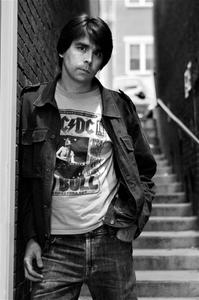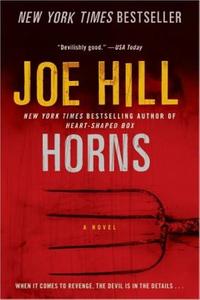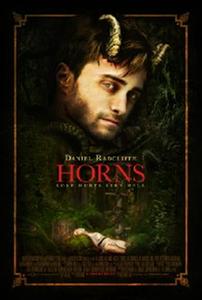
|
|
| photo: Shane Leonard | |
Joe Hill's second novel, Horns (2010), is the story of Ignatius Perrish, a young man who's been accused of killing his girlfriend. After going on a particularly epic drinking binge, he wakes up one day to find devilish horns growing from his head. Worse still, anyone he comes into contact with tells him their deepest, darkest secrets--secrets he really doesn't want to hear. But to find and punish the true killer, he must listen to the people he least wants to be brutally honest with him: his family.
Horns is now a movie starring Daniel Radcliffe, in theaters now, and available on iTunes and other video-on-demand services.
Where did you get the idea for Horns?
My answer on that isn't terribly sexy. Because you want to have this one jolting moment of inspiration where the whole thing kind of came together, but the truth is that Horns is my third attempt to explore one particular concept. The first was an epic fantasy novel called Fear Tree. Fear Tree was a kind of Tolkien-esque thing. But the hero was a blind man who had the psychic power to guess whatever scared people the most. And the book became a huge international bestseller... in my imagination. In real life, I was never able to sell it. This was a book I wrote well before Heart-Shaped Box. There were still a lot of things I needed to learn how to do. I needed to learn some things about economy. I needed to learn how to write dialogue. I needed to figure out how to write a story where the ambitions of the story scaled to my abilities.
Heart-Shaped Box came out [in 2007], and it was this huge, huge hit. Bigger than I ever imagined. It came after years of trying to break through. I had sort of done this thing with the pen name where no one really knew about my family or about my dad, Stephen King. I was trying to break through on my own merit; that turned out to be really hard.
I bet. What came next?
Eventually I sold a book of stories to PS Publishing in England. When Peter Crowther bought it, he didn't know who I was related to, he just really liked the stories. But that came after years and years of rejections and three novels that I wasn't able to sell. So, then, Heart-Shaped Box was like a 10-car pileup of all my daydreams. I know it's really clichéd to have that second book slump, but I kind of froze. I went through this tremendous period of joy and excitement and freedom, and then massive collapse. It was like I couldn't figure out how to write.
I just felt devastated. I had no idea how I'd managed to write Heart-Shaped Box. I felt like I couldn't do anything, except I had a comic book going [Eisner Award winner Locke & Key]. And the comic book made me feel happy. The comic book felt like a success. But I couldn't figure out how to write.
So, then I started writing a book called The Surrealist's Glass. And it reused many of the ideas from Fear Tree. It was about a guy who had a lens, a little monocle that he could look through that would show the secret truths of things on the other side of the glass. It would reveal people's secrets. And the only problem with that book is that it really sucked.

Yeah, other than that, it was fine. It was just unreadable crap that had no heart. I actually didn't quite finish it. I got about 480 pages in, and then I scrapped it. And then I just had this quiet week when my head went still, and I relaxed a little bit. In the course of that week, I wrote the first hundred pages of Horns.
I felt like I suddenly had discovered what the story had always needed. It needed what every story needs: it needed the devil. You don't really have a story until the devil walks onto the set. Once I knew the story was about the devil, it flew together pretty quickly. It was a hard book to write. I wasn't in a great state mentally or emotionally.
It's an unhappy, paranoid book written by an unhappy, paranoid man. I'm very proud of it; but for me, when I go back to it, it's kind of like touching a scar.
In some ways I like the movie better than the book because the movie is fun and free, and I have a little distance from it. I'm glad Alexandre Aja, who directed it, didn't try to make the movie the book on a screen. I think the best thing about the film is that it has a real breakthrough performance from Daniel Radcliffe. The main character in the book goes through so much emotionally. So much loss. So much grief. So much pain. He goes through madness. He experiences glee, delight, revenge--all that stuff. And Daniel Radcliffe managed to bring all those things to the screen and make it look effortless.
Dan is a guy who, above and beyond Harry Potter, has worked really, really hard to master his craft. He really loves acting. He loves doing voices. He loves to impersonate. He was exciting to work with, and I love what he did.
 What was your role in the production process? What were the cool things you got to do?
What was your role in the production process? What were the cool things you got to do?
The coolest thing was they let me put on the horns. I'll have to put up pictures on the web at some point. The special effects guys brought me into the trailer and they said, "We haven't tested the stages of horn development yet. Let's test it on you." And you kind of get used to walking around with them until you get to the drive-thru window at McDonald's. The woman is staring through the window at you, and she's spilling your Coke....
What else did you do on the movie?
I'm an executive producer, but I don't really know what that credit means. I don't think there's anyone who has an executive producer credit who actually understands what the nature of the job is. I read over the script and shared my thoughts with them. And sometimes had arguments. I won some arguments, and I lost some arguments.
The one thing you hope for as a writer is when they adapt your book to the movie screen, they won't spread shame all over the book. In this case, I feel like artistically I hit the jackpot, because they made a really great film--something that's really fun to watch that I think a lot of people are going to love. But artistically hitting the jackpot isn't the same as commercially hitting the jackpot. You can't control whether or not something is going to be a hit. You can exert a little control over whether or not something is good. But in this case it worked out; we wound up with something really good. At least I think so. --Rob LeFebvre, freelance writer and editor

